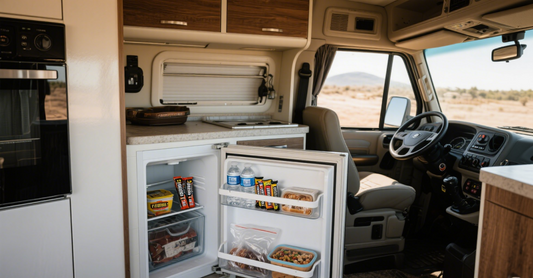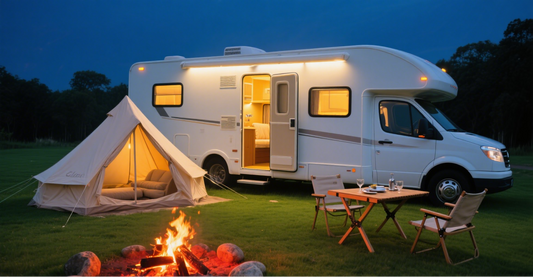Can an RV Converter Operate Without a Battery
RV camping gives you the freedom to explore the open road, but unexpected battery problems can disrupt your entire travel plans and result in expensive vehicle repairs. For many RV owners, the RV converter (also known as the RV converter charger) is a key component of the RV electrical system, which powers the RV electrical appliances. In this guide, Temgo will discuss with you the role of the RV converter and the importance of RV batteries to enhance your outdoor adventure travel experience.


Understanding the RV Converter in Your Camper
A recreational vehicle power converter, commonly called an RV converter or camper power converter, is a cornerstone of your RV electrical system. Its primary role is to transform 120V AC (alternating current) power from an external source, such as shore power at a campground or a generator, into 12V DC (direct current) power. This DC power is essential for operating RV components like water pumps, lights, fans, and refrigerators, which rely on a 12V system.
Beyond powering appliances, the RV converter serves as an RV battery charger inverter, recharging the RV house batteries (the batteries powering onboard appliances) when connected to shore power. Typically located near the fuse box or circuit breakers, the converter ensures a steady DC power supply.
Modern RV converters are designed to work with advanced charging systems, supporting both traditional lead acid batteries and high-efficiency RV lithium batteries for optimal performance.


Can an RV Converter Work Without a Battery
The question “Will an RV converter work without a battery?” is common among RV owners, especially those troubleshooting power issues or setting up their camper for the first time. Technically, an RV power converter can function without a battery. When plugged into shore power or a 30-amp hookup, the converter directly converts AC to DC power, supplying electricity to DC appliances like water pumps and lights without relying on a battery. For RV owners facing a sudden battery failure, this setup may seem like a quick fix, but it risks compromising your trip’s reliability.
Operating a converter without a battery, while feasible, has significant limitations. Without a battery, the RV electrical system lacks a backup power source, meaning appliances will stop functioning if shore power is interrupted, such as during a power outage or when boondocking off-grid. Most modern multi-stage RV converters are designed to work with batteries, making battery-less operation less efficient and introducing risks to system stability. While RV converter work is possible in this scenario, it’s not recommended for long-term use due to potential inefficiencies and damage.
Therefore, in order to enhance the safety of your camping experience and sustainable power supply, you can choose 12V lithium batteries of different capacities according to your trip plans.


Risks of Operating a Converter Without a Battery
Running RV converters without a battery can lead to issues that compromise the performance and safety of your RV electrical system. Understanding these risks is critical to avoid costly repairs and ensure a reliable camping experience.
Voltage Instability
RV batteries act as a buffer, stabilizing the DC power supply and preventing voltage fluctuations. Without a battery, the RV converter may struggle to maintain consistent voltage levels, leading to spikes or drops that can cause potential damage to electronics, such as TVs, refrigerators, or control panels. For instance, a voltage spike could fry a refrigerator’s control board, costing hundreds in repairs. This instability is especially problematic when running high-demand appliances, as the converter may not adjust quickly enough to balance the load.
Converter Overload
Many RV converters, including single-stage and multi-stage models, are designed to work in tandem with a battery. Without a battery, the converter may interpret the system as having a fully discharged battery and operate at maximum capacity continuously. This can overload the converter, particularly when powering high-wattage DC appliances like furnaces or water pumps, reducing its lifespan. Replacing a converter is far more expensive and time-consuming than installing a battery, making this a risky choice.
System-Wide Damage
Prolonged operation without a battery increases the risk of damaging the entire RV electrical system. Voltage spikes can harm wiring, circuit boards, and appliances, leading to malfunctions or complete system failure. These risks are particularly concerning for owners considering lithium batteries, which require stable power to maximize their lifespan. Such repairs can disrupt your camping plans and diminish your RV’s reliability.
Given these risks, operating a converter without a battery is not advisable. A battery is essential for a stable, safe power supply, protecting your equipment and ensuring peace of mind.
Why Use an RV Battery with Your Converter
Installing a battery in your RV electrical system can improve the functional use of the RV interior and protect the RV electrical appliances. RV inverter battery chargers are used in conjunction with batteries to optimize the following uses by effectively managing the current:
Power Availability for Off-Grid Camping: A battery ensures power when shore power is unavailable, such as during boondocking or outages. This is invaluable for remote camping, allowing appliances like lights and water pumps to function without external power.
Voltage Regulation for Appliance Safety: By stabilizing voltage, a battery protects electronics from surges and fluctuations. Built-in BMS function of the lithium battery can achieve voltage regulation capability, ensuring efficient operation of the appliance and extending its service life.
Extended Lifespan of the Converter and System: A battery reduces the converter’s workload by absorbing excess energy and balancing power demands, minimizing wear and tear. These benefits translate to fewer maintenance headaches and more time enjoying your RV adventures.
So, whether you’re plugged into a 30-amp hookup or camping off-grid, using lithium batteries will increase power reliability and protect your equipment, making it a must-have battery choice for any RV setup.
Choosing the Right RV Battery for Your Converter
Choosing the right battery for your RV, camper or van can significantly improve its performance, convenience and cost-effectiveness. Here are some common battery options to help you make an informed choice:
| Battery Type | Lifespan (Cycles) | Weight | Maintenance | Charging Speed | Cost |
|---|---|---|---|---|---|
| Flooded Lead-Acid | 200–500 | Heavy | High (electrolyte checks) | Slow | Low |
| AGM (Sealed Lead-Acid) | 500–1,000 | Moderate | None | Moderate | Moderate |
| Lithium (LiFePO₄) | 3,000–4,000+ | Light | None | Fast | Higher (long-term savings) |
· Lead-Acid Batteries: Flooded lead-acid batteries are affordable and provide stable power but require regular maintenance (e.g., checking electrolyte levels) and have a shorter lifespan (2–5 years). Their weight and limited cycle life make them less ideal for frequent RV use.
· Absorbent Glass Mat (AGM) Batteries: AGM batteries are maintenance-free, handle deep discharges better, and charge faster than flooded lead-acid batteries. However, they are heavier and have a shorter lifespan compared to lithium options, making them a middle-ground choice.
· Lithium Iron Phosphate (LiFePO4): Lithium batteries offer significant advantages. They are lightweight, improving RV fuel efficiency, and have a lifespan of over 3,000 cycles (Temgo 12V lithium batteries, for example, have a cycle life of over 4,000+). LiFePO4 batteries support deep discharges without breaking down, providing more usable power for off-grid travel. Their fast charging capabilities, compatibility with solar or generator charging systems, and extremely low maintenance costs make them ideal for RV camping.
They maintain a steady voltage output, ensuring reliable performance, and are safer, with a stable chemistry that reduces the risk of overheating or leakage. While lithium batteries have a higher initial cost, their long life and low maintenance costs often save money over time, making them more affordable for those who use their RV frequently.
When choosing a battery, consider your power needs (measured in amp-hours, Ah), the battery’s size and weight for RV storage, and compatibility with your RV converter charger. Some converters optimized for lead acid batteries may need adjustments to charge lithium batteries effectively, so consult your converter’s manual or a professional. Lithium batteries’ high energy density and temperature tolerance make them well-suited for modern RV converters and varied camping conditions.
Conclusion: Start Your RV Adventure
While an RV converter can technically handle RV converter work without a battery when connected to shore power, this setup risks voltage instability, converter overload, and potential damage to your RV electrical system. A battery is essential for stabilizing power, protecting appliances, and ensuring reliability during off-grid adventures or outages. Lithium (LiFePO4) batteries, with their lightweight design, long lifespan, fast charging, and compatibility with modern charging systems, are an excellent investment for RV owners, whether you’re a weekend camper or a full-time RVer.
To power your next trip, evaluate your power needs and consider upgrading to a high-quality LiFePO4 RV battery. Visit the Temgo shop to explore our selection of LiFePO4 RV batteries that are designed to integrate seamlessly with your RV converter and are built with a focus on performance. With the right battery, you can enjoy your road trip with confidence knowing your electrical system is ready for any adventure.


